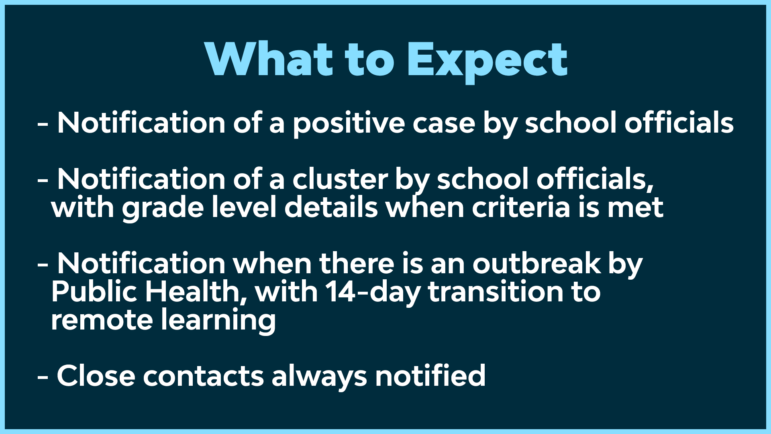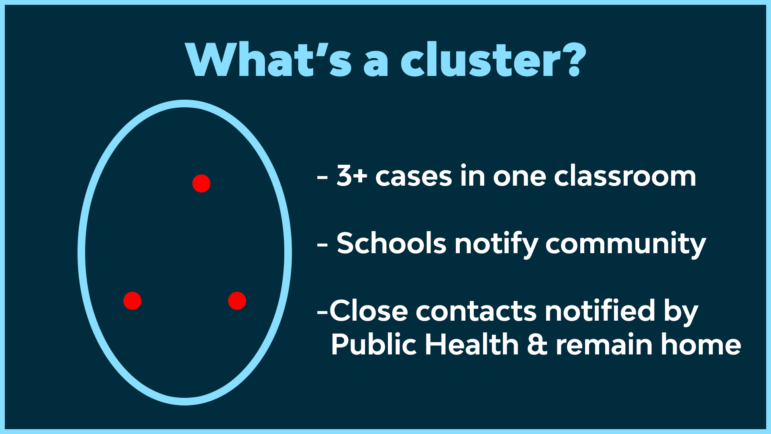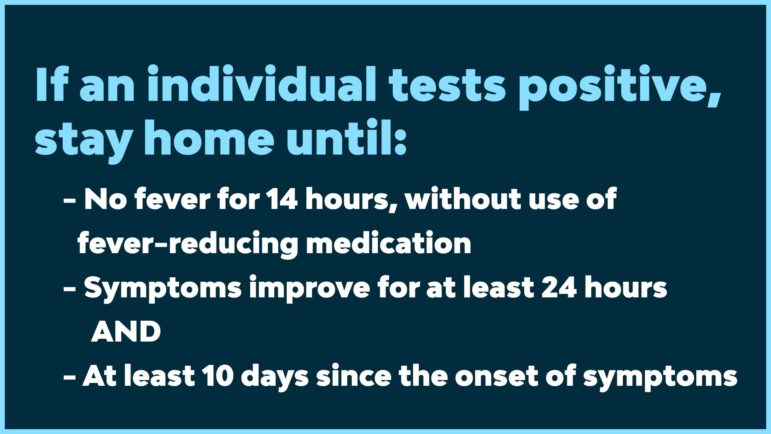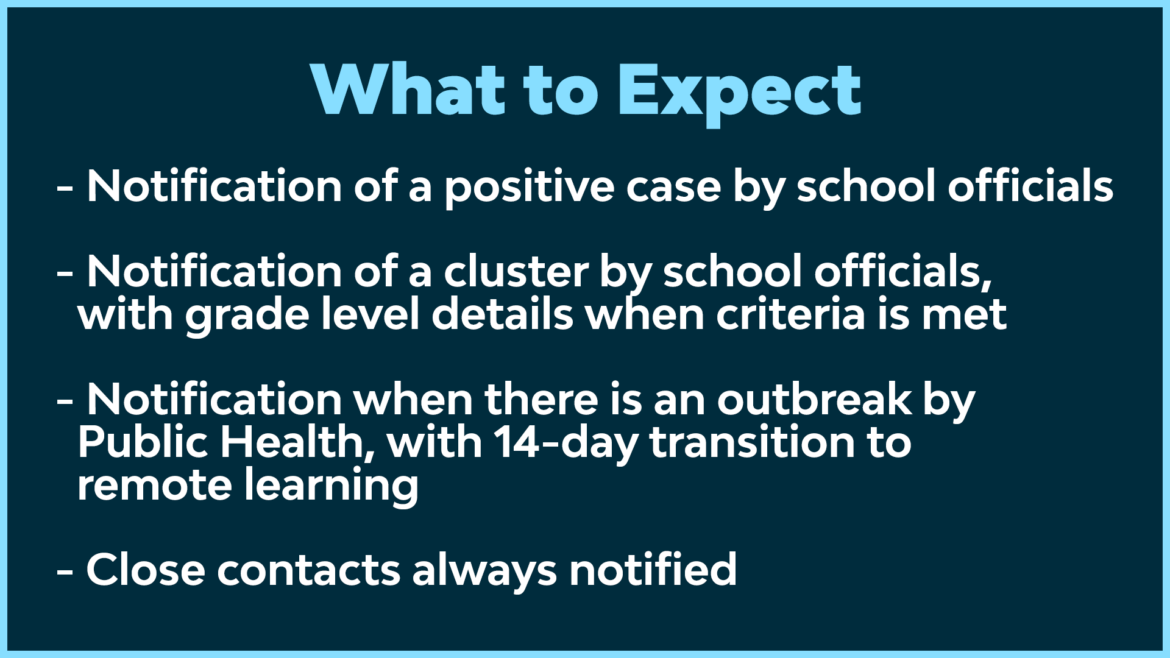By PAULA TRACY, InDepthNH.org
CONCORD – Gov. Chris Sununu outlined how schools should deal with an outbreak of COVID-19 this fall, and announced an opening up of visitation at long-term care facilities during a Thursday press briefing.
Sununu also announced plans to allow child-care centers to increase classroom size from 10 to 20 children.
Education Guidance
Sununu outlined a protocol the state will use to guide schools if an outbreak occurs at a school expected in a new order to be released Thursday.
The guidance goes over the reporting chain for a case of COVID-19 in a school and indicates that a school might need to close if there are at least three or more clusters identified in a school (three classes and transmission in the cafeteria, for example.)
If an outbreak is identified, the state Department of Health and Human Services might recommend a remote learning model for the entire school for at least 14 days. It could be that a cluster of three in one class could be isolated so that the entire school does not have to close, Sununu said.
The school community will be notified when clusters are identified and there will be a centralized website with information for parents to access to eliminate the rumor mill, Sununu said. He said he wants to make sure the data is available.
When a positive case is reported in a school, public health officials will contact the individual, and if a student who is under 18, their parents/guardians. Public Health will also notify the school, who will then notify their community, Sununu said on Twitter and posted the explainers below.
https://www.governor.nh.gov/sites/g/files/ehbemt336/files/documents/emergency-order-29-p.pdf



Lori Shibinette, the state commissioner of Health and Human Services, reported 34 new cases of the coronavirus Thursday for 6,921 total in the state since March with no new hospitalization. There were two new deaths totaling 422 in the state, mostly among residents of long-term care centers.
The state has been able to close an outbreak case at Ridgewood Genesis in Bedford leaving only two long-term care facilities left facing three or more cases of the virus. The state announced that it is now a system of phases for reopening long-term care facilities which are predicated on the level of current cases of the virus by county.
This will ultimately allow residents to have as many as two visitors inside the center per resident, which will greatly allow for their psycho-social wellbeing, said Shibinette.
Phase 0 would be the outbreak stage where three or more residents are infected. There will be no communal dining there, no group activities, and no visitors.
Phase 1, which the state has been at since July 1, allows activities, limited communal dining, and only medically necessary trips outside of the facility for residents.
Phase 2 the state facilities go to as of Thursday, allow all the non-outbreak facilities to allow one support person into the facility per resident. This includes hairdressers, who can come back to a certain degree, she said.
“It feels like such a minor thing but it is such a major thing for self-esteem and dignity,” she said.
Group activities are limited to no more than 10 people with masking and physical distancing but will be allowed in this phase.
If facilities can go for 14 days with no cases, the facilities can move to Phase 3, which will allow the facility to open up to two visitors.
All will be limited by the number of 10 cases per 100,000 residents by counties which now Grafton, Coos, and Merrimack qualify for.
Sununu called it “terrific news.”
If we start to see outbreaks or another surge by counties we might have to pull back, Shibinette said.
Special Needs Students
Sununu said he finalized the actual emergency order for school reopenings Thursday and he wants to really ensure that some of the most susceptible students are not left behind.
There were gaps for certain kids when the schools closed last March. So similar to Emergency Order #48, it will require that special education requirements are not waived. Those with an IEP will have those needs met and provided by the school, Sununu said.
It’s not just federal law but a moral commitment, Sununu said to those children and their families, to get an education suited to their needs. He said there is money there to address those needs and the Department of Education will work with districts.
He noted an additional $17 million of pre-COVID-19 money is in the system to address this including money for vocational rehabilitation.
“We know that the resources are there,” Sununu said, and he rejected a letter from the teachers’ unions imploring him to delay assessment.
“We are not going to delay this,” Sununu said, noting so many of the children with IEPs fell through the gaps last spring when schools closed.
Child Care
Effective immediately child-care center classrooms can go from a limit of 10 to 20 children, Sununu said. Houses of worship may also open their child care centers.
College Students
Shibinette said the state is asking colleges to tell their students that once they get to campus they need to place their local address on their requisitions for COVID-19 testing, allowing those statistics to be counted in New Hampshire rather than their home state or town.
This will help to have college towns know if there is an outbreak on campus.
Shibinette said pre-testing is already identifying COVID-19 cases before the students get to campus and she called that a good catch.
Students must present a negative test prior to entering campus.
NH Data
Sununu pointed to a number of trends and charts which show mostly good news on the state containing the virus.
A look at the three day average of positive tests per those tests given is about 1 percent range. Low hospitalizations – now at 18- allow for capacity if there is a surge.






